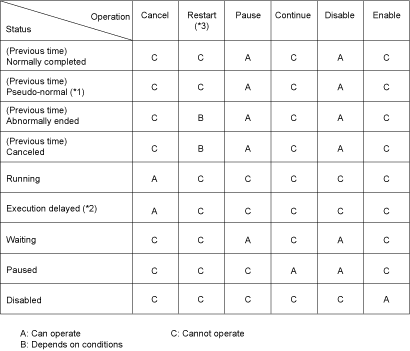The scheduled jobs can be operated as necessary. There are 6 types of operations (cancel, restart, pause, continue, disable and enable). If the execution attribute is "Interstage" or "normal" (UNIX version), operations are not available.
The following describes how to operate the scheduled jobs and types of operations.
Before any scheduled job operation is carried out, a dialog box to confirm the operation will be displayed to prevent any operational errors from occurring. For details on setting, see "7.10 Preventing Operational Errors on Job Nets, Jobs and Groups".
Procedure
Select the desired job from the Monitor Job Net window, then select the desired operation item from the Operation of the File menu (or select the desired operation item from the Operation pop-up menu displayed by right-clicking).
Operation types
The types of the job operations are as follows.
Cancels jobs that are running, in a warning state or have been delayed.
Restarts jobs that have abended or been canceled. Note, however, that a restart cannot be performed if a recovery job is running, in a warning state or has been delayed.
When connected to any server with Systemwalker OperationMGR V10.0L21 or V10.1 or older, the job net can only be restarted when it is in the warning status. Also, the recovery jobs cannot be restarted. The operation will be ignored.
Point
Information specified by a temporary job change
Job nets that are running as a result of a restart operation and higher-order job nets are handled in the same way as job nets started by a restart operation. This means that any information specified by a temporary job change is valid.
Point
Behavior when a restart operation is performed on a recovery job
If a restart operation is performed on a recovery job and the recovery job completes normally, the Restart previous job check box in the Control information sheet of the Add/Change - Job window will determine whether the original job of the recovery job will be restarted.
For the abended or canceled jobs, more specific operations can be carried out by recovery operations. For details, see "7.6 Recovering Scheduled Jobs".
Pauses the waiting jobs and completed jobs. Once a job is paused, it cannot be executed even if the preceding job is normally completed. The succeeding jobs will not be executed either.
Cancels the paused status of the job. The job resumes the status before pausing. If the preceding job is normally completed while the job is being paused, the job will be started after resuming. For the recovery job of which the preceding job is abended while the job is being paused, the job will be started after resuming.
Disables the waiting, paused and completed jobs. The disabled jobs cannot be started even if the preceding job is normally completed (as it is considered to be pseudo-normally completed). The succeeding job is started when the preceding job is normally completed. When a recovery job for which Restart previous job is specified is disabled, the original job will not be restarted.
Cancels the disabled status of the job. The job resumes the status before disabling. If it was paused before disabling operation, it resumes the status before pausing. If the preceding job is completed while the job is in the disabled status, the job will be in the completed status.
Relationship between job status and operations
The following shows the operations that can/cannot be carried out for each job status.

The pseudo-normal is the status of job including any job with of which the completion code is between 1 and the normal completion code upper limit.
If the pseudo-normal status is not validated in the Define Jobscheduler Startup Parameters window, the pseudo-normal status will be indicated as the normal completion.
The execution delayed is the status in which the job is connected to the queue but has not been executed.
The relationship between the status of jobs and higher-order job nets and restart operations is as follows:
A restart operation cannot be performed if the status of a higher-order job net, including the parent job net, is "Waiting".
A restart operation cannot be performed if Invalid at next restart is specified for a higher-order job net, including the parent job net.
A restart operation cannot be performed if the status of the next job is "Delayed", "Executing", "Warning", "Completed", "Pseudo-normal", "Abended" or "Canceled". (This includes when the job status has changed to Paused or Disabled after being any of the statuses listed here.)
When a higher-order job net, including the parent job net, is contained in a group, a restart operation can be performed only when the status of a job net containing jobs is "Warning".